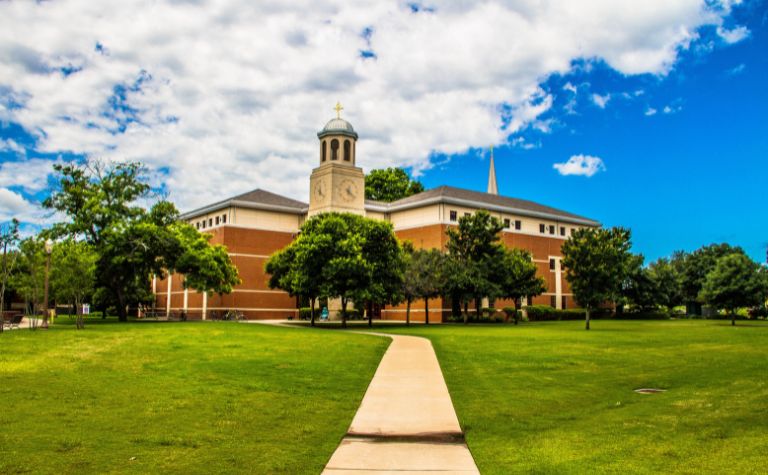Choosing the right educational path is a significant decision that can shape your future in many ways.
When considering a Seminary or a Christian Liberal Arts University, it’s crucial to understand the key differences between the two.
Both offer unique experiences and opportunities but serve different educational and career goals.
This article aims to provide a comprehensive comparison, covering aspects like educational focus, degree programs, student life, and more.
By the end of this guide, you’ll understand what each type of institution offers, helping you make an informed decision for your future.

Comparing Seminary and Christian Universities
Some Christian universities offer graduate degrees in ministry, theology, missions, and more.
The table below compares a more traditional and conventional approach to seminary and four-year undergraduate universities.
| Graduate-Level Seminary | Undergraduate University | |
|---|---|---|
| Educational Level | Graduate | Undergraduate |
| Duration | Typically 2-4 years (e.g., M.Div. is 3 years) | Typically 4 years |
| Primary Focus | Advanced theological studies, pastoral training, and ministry leadership | Broad academic disciplines with a Christian worldview; includes arts, sciences, business, etc. |
| Degree Offered | Master of Divinity, Master of Theology, Master of Arts, etc. | Bachelor of Arts, Bachelor of Science, among others in various fields |
| Admission Requirements | Bachelor’s degree, letters of recommendation, statement of purpose | High school diploma or equivalent, SAT/ACT scores, personal statement |
| Curriculum | In-depth theological courses, biblical languages, pastoral counseling, homiletics | General education courses combined with major-specific classes; may include mandatory theology or Bible courses |
| Practical Experience | Internships, pastoral residencies, field education | Internships, study abroad, research projects, student teaching, etc. |
| Accreditation | Accredited by theological and regional accrediting bodies | Accredited by regional and/or national accrediting bodies |
| Career Paths | Pastor, theologian, counselor, academic, missionary | Varies widely based on major: educator, business professional, scientist, artist, etc. |
| Campus Life | Often includes on-campus housing, libraries, and research facilities | Traditional college experience with dorms, student organizations, sports, and campus events |
| Cost | Typically higher due to the advanced nature of the studies | Varies based on the university’s size, location, and offerings |
| Financial Aid | Some scholarships, grants, loans, and work-study opportunities | Some scholarships, grants, loans, and work-study opportunities |

Purposes of Christian Seminaries and 4-Year Universities
When it comes to the core curriculum, Seminaries and Christian Liberal Arts Universities differ significantly.
Seminaries are specialized institutions that primarily focus on theology, pastoral studies, and other disciplines directly related to leadership roles within a community.
The aim is to prepare students for roles such as pastors, counselors, or theologians.
On the other hand, Christian Liberal Arts Universities offer a broader range of subjects, from sciences and humanities to arts and social sciences.
While these universities may have strong theological departments, the educational scope is much wider, allowing students to explore various fields and career paths.
The goal here is to offer a well-rounded education that equips students with a diverse skill set, applicable to multiple professions.
Degrees That Seminaries and Universities Offer Students
The primary degree programs in a seminary are often geared toward advanced studies in theology, biblical languages, and pastoral care.
The most common degree offered is the Master of Divinity, which is considered a professional degree for individuals aiming for leadership roles in their communities.
Some seminaries also offer doctoral programs for those interested in academic or high-level organizational roles.
Contrastingly, Christian Liberal Arts Universities offer a wide array of undergraduate and graduate degrees in various fields.
Whether you’re interested in business, psychology, engineering, or the arts, you’ll find a program that suits your interests.
These universities also offer theology or pastoral studies as just one of many options, not the central focus.
This diversity in degree programs allows students to either specialize or generalize their education, depending on their career goals.

Comparing the Curriculum
In a seminary, the curriculum is highly specialized, focusing on subjects like theology, biblical studies, and pastoral leadership.
Courses often include Old and New Testament studies, ethics, and counseling, aimed at preparing students for roles in spiritual leadership or academic research.
The coursework is designed to be in-depth and rigorous, providing a comprehensive understanding of the chosen field.
On the other hand, Christian Liberal Arts Universities offer a broader curriculum that includes general education requirements in sciences, humanities, and social sciences.
While theology courses are available, they are part of a wider array of subjects that students can explore.
This type of curriculum is designed to produce well-rounded individuals with critical thinking skills applicable to various professions.
The flexibility allows students to double major or minor in different fields, providing a more versatile educational experience.
Student Demographics
In seminaries, the student body is often more homogenous, consisting mainly of individuals who are pursuing specialized roles such as pastoral leadership, counseling, or academic research in theology.
The age range can be broader, as many students may have already completed an undergraduate degree or have work experience before deciding to attend seminary.
Conversely, Christian Liberal Arts Universities attract a more diverse student population.
These institutions often have students straight out of high school, as well as non-traditional students, all pursuing a variety of majors.
Accreditation and Affiliations
Seminaries often hold specialized accreditation from bodies that focus on theological education.
This ensures that the institution meets specific standards in areas such as faculty qualifications, curriculum, and resources.
These accreditations are crucial for students who aim to pursue specialized roles that require a high level of expertise in theology or related fields.
On the other hand, Christian Liberal Arts Universities usually hold regional accreditation, which is a more general form of educational approval.
This allows them to offer a broader range of degree programs across various disciplines, from humanities and sciences to business and arts.
Some may also have additional accreditations for specific departments or programs, such as business or nursing.
Both types of institutions may have affiliations with particular denominations or organizations, but the scope and impact of these affiliations can vary.
In seminaries, such affiliations often have a more direct influence on the curriculum and ethos of the institution.
In contrast, Christian Liberal Arts Universities may maintain a more general connection to their affiliating bodies, allowing for a wider range of viewpoints and academic pursuits.
Campus Life
The atmosphere on a seminary campus is often more focused and specialized, given the institution’s primary aim of preparing students for specific roles in theology and related fields.
Activities, workshops, and community events usually revolve around this central theme, offering students opportunities to deepen their expertise and network with like-minded individuals.
In contrast, Christian Liberal Arts Universities offer a more diverse campus life, reflecting their broader academic offerings.
Students can participate in a wide range of extracurricular activities, from sports and arts to various academic clubs.
The social scene is also more varied, with events and gatherings that cater to a multitude of interests.
While both types of institutions often emphasize community involvement and service, the ways in which they do so can differ.
Seminaries may focus on outreach programs and initiatives that are closely tied to their specialized fields of study.
Christian Liberal Arts Universities, however, usually offer a broader array of community service opportunities that allow students to explore different avenues for making a positive impact.
Career Opportunities
In a seminary, the career trajectory is generally more specialized.
Students often go on to roles such as pastors, theologians, or counselors, where a deep understanding of theology and related disciplines is required.
The training is designed to equip students with the skills and knowledge needed for these specific career paths.
On the other hand, a Christian Liberal Arts University offers a more diverse range of career opportunities.
Given the broader academic focus, students can pursue degrees in fields like business, science, arts, and humanities, in addition to theology.
This opens doors to a wide array of professions, from healthcare and law to education and the corporate world.
Both types of institutions often have strong alumni networks and career services, but the scope and focus of these resources can vary.
Seminaries may offer more targeted job placement assistance in theological and related sectors, while Christian Liberal Arts Universities typically provide more generalized career support that caters to a diverse set of industries.
Cost and Financial Aid
When it comes to the financial aspect, seminaries often have specialized funding options, such as scholarships and grants aimed at students pursuing ministry or theological studies.
These financial aid options can sometimes cover a significant portion of tuition and other expenses.
Christian Liberal Arts Universities, by contrast, usually offer a broader range of financial aid packages, including academic scholarships, athletic scholarships, and federal student aid.
These institutions may also have higher tuition fees due to the wider array of amenities and programs they offer, such as state-of-the-art labs, sports facilities, and extracurricular activities.
Both types of institutions generally offer work-study programs and payment plans to make education more accessible.
However, the overall cost can vary widely depending on the specific school, degree program, and financial aid availability.
It’s crucial to research and compare the financial aspects of each option to determine which is the most feasible for your educational and career goals.
Recent Posts
David Jeremiah, a renowned pastor, author, and speaker, has captivated the hearts of many with his compelling sermons. His messages resonate deeply with diverse audiences, leaving an enduring...
Tim Keller, a distinguished pastor, theologian, and author, has garnered a devoted following through the profound impact of his sermons. In this article, we will explore seven compelling reasons...
